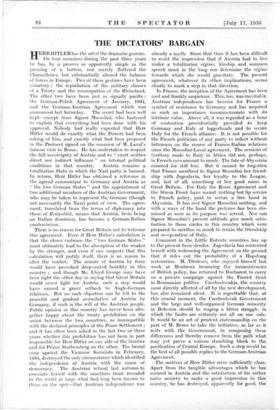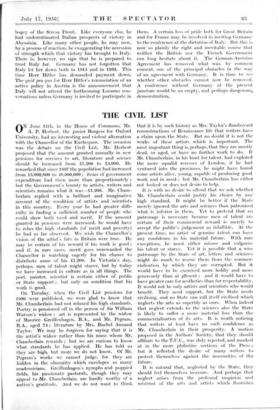THE DICTATORS' BARGAIN
ITERR HITLER has the art of the dramatic gesture. -1- On four occasions during the past three years he has, by a process as apparently simple as the pressing of a button, not merely fluttered the Chaneelleries, but substantially altered the balance of forces in Europe. Two of these gestures have been minatory : the repudiation of the military clauses of a Treaty and the reoccupation of the Rhineland, The other two have been just as signally pacific : the German-Polish Agreement of January, 1934, and the German-Austrian Agreement which was announced last Saturday. The secret had been well kept—except from Signor Mussolini, who hastened to explain that everything had been done with his :approval. Nobody had really expected that Herr Hitler would do exactly what the Powers had been asking of him, and exactly what had been proposed in the Protocol signed on the occasion of M. Laval's famous visit to Rome. He has undertaken to 'respect the full sovereignty of Austria and to " exert neither direct nor indirect influence " on internal political conditions in that country. Austria remains a totalitarian State in which the Nazi party is banned. In return, Herr Hitler has obtained a reference in the agreed communiqué to Germany and Austria as " the two German States " and the appointment of two additional members of the Austrian Government, who may be taken to represent the German (though not necessarily the Nazi) point of view. The agree- ment, translated from the terms of diplomacy into those of Realpolitik, means that Austria, from being an Italian dominion, has become a German-Italian condominium.
There is no reason for Great Britain not to welcome this agreement. Even if Herr Hitler's calculation is that the closer embrace the " two German States " must ultimately lead to the absorption of the weaker by the stronger, and even if one suspects that this calculation will justify itself, there is no reason to alter the verdict. The seizure of Austria by force would have provoked deep-seated hostility in this country ; and though Mr. Lloyd George may have been right the other day in saying that Great Britain would never fight for Austria, such a step would have caused a grave setback to Anglo-German relations. But no such objection can be felt to the peaceful and gradual assimilation of Austria by Germany, if such is the will of the Austrian people. Public opinion in this country has never been alto- gether happy about the treaty prohibition on the union between the two countries, so incompatible with the declared principles of the Peace Settlement ; and it has often been asked in the last two or three years whether this prohibition has not been in part responsible for Herr Hitler on one side- of the frontier and for Prince Starhemberg on the" other. The brutal coup against the Viennese Socialists in, February, 1934, destroyed the only circumstance which identified the independence of Austria with the cause of democracy. The Austrian refusal last autumn to associate herself with the sanctions front revealed to the world at large what had long been known to those on the spot—that Austrian independence was already a myth. Since that time it has been difficult to resist the impression that if Austria had to live under a totalitarian regime, kinship and common speech must in the long run determine the regime towards which she .would gravitate. The, present agreement, whatever its other implications, seems clearly to mark a step in that direction.
In France, the reception of the Agreement has been cool and frankly suspicious. This, too, was inevitab!e. Austrian independence has become for France a symbol of resistance to Germany and has acquired as such an importance incommensurate with its intrinsic value. Above all, it was regarded as a bone of contention providentially provided to keep Germany and Italy at loggerheads and to secure: Italy for the French alliance. It is not possible for the French politician of any party to reflect without bitterness on the Course of Franco-Italian relations since the Mussolini-Laval agreement. The cessions of territory made to Italy in Africa did not, perhaps, in French eyes amount to much. The fate of Abyssinia counted for still less. But it cannot be forgotten that France sacrificed to Signor Mussolini her friend- ship with Jugoslavia, her loyalty to the League, and, last of all, something of her good name in Great Britain. For Italy the Rome Agreement and the Stresa Front- have meant nothing but lip service to French policy, paid to secure a free hand in Abyssinia. It has cost Signor Mussolini nothing, and with a wave of the hand the pretence has been dis- missed as soon as its purpose was served. Nor can Signor Mussolini's present attitude give much satis- faction to those circles in this country which were prepared to sacrifice so much to retain the friendship and co-operation of Italy.
Comment in the Little Entente countries has up- to the present been slender. Jugoslavia hakcontented herself with welcoming the Agreement on the ground that it rules out the probability of a Hapsburg restoration. M. Titulesco, who enjoyed himself last week at Montreux trouncing the inconsistencies of British policy, has returned to Bucharest to carry on a private campaign against the Fascist front in Roumanian politics. Czechoslovakia, the country most directly affected of all by the new development, has also remained silent. It is regrettable that, at this crucial moment, the Czechoslovak Government and the large and well-organised German' minority in Bohemia should be waging a bitter struggle, in which the faults are certainly not all on- one side. It would be an act of prudent statesmanship on the part of M. Benes to take the' initiative, so far as it rests with the Government, in composing these differences and thereby remove from the path what may yet prove a serious stumbling block to the pacification of Central Europe. Such a step would be the best of all possible replies to the German Austrian Agreement.
The motives of Herr Hitler seem sufficiently clear. Apart from the tangible advantages which he has. secured in Austria and the satisfaction of his rather naive anxiety to make a good impression. in this country, -he has destroyed, apparently for -good; the bogey of the Stresa Front. Like everyone else, he had underestimated Italian prospects of victory in Abyssinia: Like many other-peOple, he may now; by a process of reaction, be exaggerating the accession of strength- which that victory has brought to Italy. There is; however,- no sign that he is prepared to trust Italy far. Germany has not forgotten that Italy let her down both in 1914 and in 1933. This time Herr Hitler has demanded payment down. The quid pro quo for Herr Hitler's renunciation of an active policy in Austria is the announcement that Italy will not attend the forthcoming Locarno con- versations unless Germany is invited to participate in them. A certain loss of pride both for Great Britain and for France may be involved in inviting Germany to the conference at -the dictation of Italy. But this is now so plainly the right and inevitable course that neither the British nor the French Government can long hesitate about it. The German-Austrian Agreement has removed what was, by common consent, one of the principal obstacles in the way of an agreement with Germany. It is time to see whether other obstacles cannot now be removed. A conference without Germany at the present juncture would be an empty, and perhaps dangerous, demonstration.















































 Previous page
Previous page